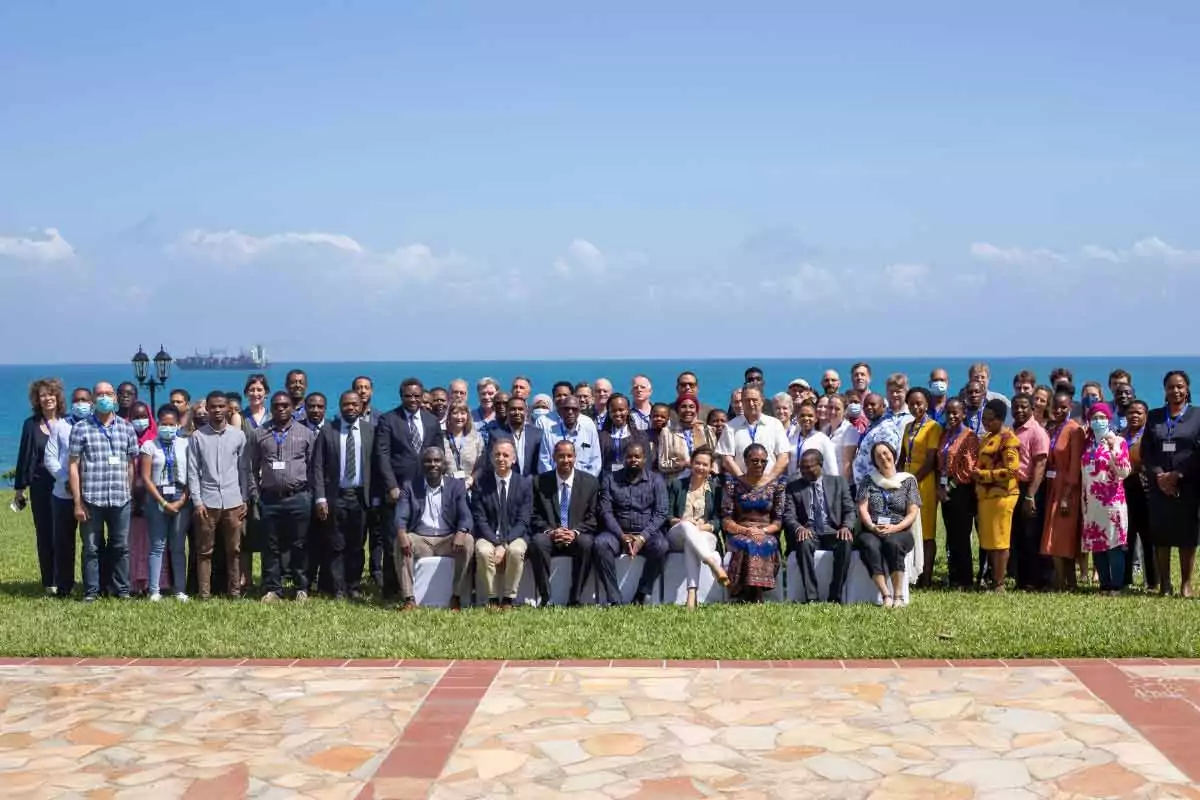The first ever MeerWissen Network Event took place from 8 to 11 June 2022 on the island of Zanzibar. The event was hosted by the MeerWissen Secretariat and the Western Indian Ocean Marine Sciences Association (WIOMSA). In 2022, projects from the 1st and 2nd MeerWissen Call will come to an end and the 3rd Call will begin. The interactive event brought together partners from all the MeerWissen projects to share lessons learned from the past few years and create synergies for a sustained impact of the initiative. Overall, the network event aimed at getting to know each other better. It offered space to discuss current challenges and ideas of collaborations about science-policy uptake, stakeholder engagement and sustainability of project activities and outcomes. The network event started with a field trip to Paje in the eastern part of Zanzibar to celebrate World Oceans Day. The activities included a tour of the Mwani Seaweed Centre, the local community centre and a marine litter collection survey on the beach. The event was officially opened by Hon Suleiman Masoud Makame, the Minister of Blue Economy and Fisheries, Zanzibar on 9th of June.
Bridging the science-policy gap
After the official opening, an interactive session about the science-policy transfer provided a forum for networking among scientists and policymakers. Participants explored concrete knowledge needs and developed ideas for new forms of collaboration according to four topics: Sustainable Blue Economy, Sustainable Fisheries, Nature-Based Solutions and Ocean Governance/Marine Protected Areas. Through the four topic-related working groups scientists and policymakers developed opportunities how to bridge the gap between marine research and policy. Important outcomes are to promote trust and capacity building and transparency when it comes to data sharing. It is important to identify mutual benefits and provide resources for intermediarys. Science communication is key to empower research and improve the relationships with policymakers, according to the participants. The need to build bridges between marine research and policy-making processes was widely recognized. There is a need for new approaches to knowledge production based on greater direct collaboration between researchers and management authorities.
Stakeholder engagement
Stakeholder engagement is a vital and iterative process during the co-design but also the implementation phase of MeerWissen projects. When bringing together experienced MeerWissen partners, the session started by identifying the four most relevant stakeholders for all projects. Split into two groups, both independently identified the same four stakeholder groups: scientists, NGO / influencers, policymakers / government, and local populations / resource users. Then, the participants joined the identified stakeholder groups in order to share their experiences of involving the respective group during their projects. A number of lessons learned, best practices and insights will be published in the Co-design Guidance 2.0 soon.
Sustainability
An overarching interest of MeerWissen is to generate long-lasting impacts of projects outcomes to effectively address societal challenges. Achieving this is a challenge for relatively short projects of 2 years duration. Therefore, it is vital that projects consider ways to enhance project sustainability from the beginning and throughout their implementation phase and share experiences among projects on how to enhance sustainability.
In the first part of this session, participants developed concrete measures for their respective projects through which they could enhance project sustainability, which included a plan for the dissemination and uptake of results, stakeholders and community involvement, and information sharing. The second part of the session focused on the young researchers in the room. They represent a generation of researchers who face a series of crises that will require research-informed solutions. However, in reality most young Africans researchers are forced to leave research to find employment elsewhere, since opportunities and jobs are scarce. This “brain drain” is a serious issue when it comes to the sustainability of human capital in environmental sciences. We listened to the stories of all young researchers in the room, telling us how they got to where they are at in their careers, and what immediate challenges they face. It was a truly touching and unforgettable experience of deep listening!
At the end of the network event all participants gave their commitments to strengthen the partnerships of equals and further engage in marine science to conserve and sustainably use our ocean and coasts.

